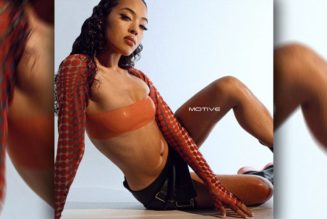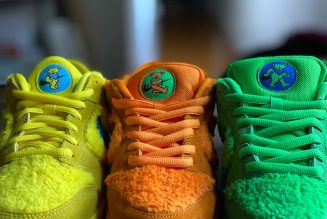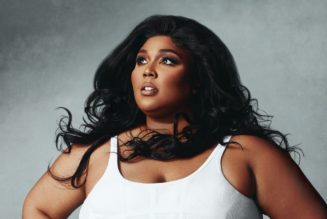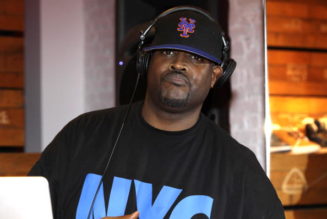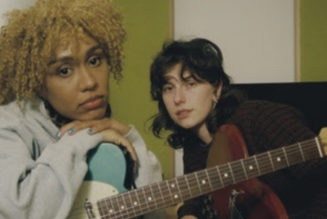
Harmony Tividad (now known eponymously as Harmony) does her best shopping on eBay. Among her recent purchases are a pink puff-sleeve ‘80s power suit and old Betsy Johnson earrings, the latter of which she notes is a domain no one is “locked in on yet.” With an amorphic sense of style that is best described as a Victorian-era Paris Hilton, she sees perusing eBay’s expansive archives as something of a sport — or, honestly, an addiction. Actually getting to wear the clothes post-purchase is a bonus, but, to her, the real fun lies in the mere potential of unearthing a niche brand or an over-the-top vintage piece.
Scouring the internet for material – both metaphysical and in garment form – is familiar territory for the singer-songwriter, who will be releasing Gossip, her debut solo album, after a nine-year stint as one-half of the indie pop band Girlpool alongside fellow guitarist, bassist, vocalist and Hollywood native Avery Tucker. Girlpool’s twangy, surrealist melodies provided anthems for legions of fans who, similar to Tividad and Tucker, felt like outsiders in their hometowns and, like Harmony, sought out community on the internet.
“I loved the internet from the time I got on the computer at age two. I was immediately obsessed with Neopets, then addicted to Tumblr as a teenager” she says. Her love of the internet even extended into her professional career: during her time in Girlpool, she’d write music on the side that drew inspiration from what was happening in internet culture.
Over their near-decade together, Girlpool gang moved from Hollywood to Philadelphia, then to New York before ultimately returning to Los Angeles, and the evolution of their music mirrored that of their personal lives and surroundings. Albums that once heard Girlpool wax poetic about on the cusp of adulthood evolved into the two reflexively looking back at various iterations of their younger selves. Girlpool’s poignant fourth and final album, Forgiveness, arrived in 2022 and midway through their tour, the band announced that they were breaking up (on good terms) so the remaining dates would act as a farewell run.
A year later, Harmony returned with the Dystopia Girl EP, self-released through her own imprint, Harmony’s Fantasy Corp. While the project’s lyricism held true to the Girlpool ethos of diaristic, heart-on-your-sleeve honesty, her sound veered more hyper-pop. Songs were less focused on the chorus and flow but rather driven by narratives, several of which saw Harmony cite viral phenomena from the early aughts. On the synth-heavy “Shoplifting From Nike,” she references Buffy the Vampire Slayer, Sanrio, Winona Ryder shoplifting from Saks and, naturally, Tumblr in just over two minutes — a staccato burst of cultural phenomena only possible from the mind of someone who grew up perpetually online.
Gossip promises an equal dose of pop culture references, albeit through a more concise concept exploring “different angles of virtue,” specifically the binary of what makes someone considered virtuous – or on the other end of the spectrum, deemed shameful.
“I’ve been a complicated person and have gone through a lot of character building to arrive at a sense of self acceptance.”
“With Gossip, it’s less about this ‘bad girl’ trope and more about bad people, complicated people and nuance,” Harmony says. “I’m a complicated person and have gone through a lot of character building to arrive at a sense of self acceptance.”
As a newfound solo artist, she recalls being initially avoidant of the sound that has come to define her new era. Since forming Girlpool, Harmony’s solo songwriting had largely lived outside of the band’s oeuvre. By the time Girlpool broke up, the singer had amassed a back catalog of unreleased singles and played a few demos for her friend Maya Laner — who performs as True Blue — during one of the first Gossip studio sessions. When Harmony voiced trepidation that the songs were “too intense, too brash,” her friend encouraged her to lean into the chaos.
At least some of the chaos goes hand in hand with being an independent artist. Girlpool, while indie at heart, was signed to the record labe Anti-. Self-releasing one’s music allows for greater creative freedom but it also requires a bootstrap, DIY attitude and the ability to execute on a budget. When ideating the music video for the Gossip cut “No Romeo,” Harmony went to her mother, a psychic by trade.
“She just goes into trance, and she’s like, “I feel like everyone is at a table and it’s gossipy and they’re discussing secrets – this kind of Victorian, debaucherous vibe,”” Harmony says.
Harmony wanted to shoot the entire video for “No Romeo” — the first visual accompaniment to her music that she’d self-directed — at one location. The vision? A fusion of Baz Luhrmann’s 1996 Romeo + Juliet, CW’s teen drama Gossip Girl and Christopher Nolan’s Oppenheimer. For the styling, which she also helmed, Harmony drew from Alessandro Michele’s Gucci for the dinner party guests’ hair and makeup.
The “No Romeo” video sees its subjects drinking and eating, a casual meal that quickly turns into a mass makeout session. At the center of it all is Harmony, wearing a green corset and warning listeners that the guy at the club probably isn’t their Romeo. While Gossip’s take on the age-old concept of virtue is probing and provoking, it’s also meant to be tongue-in-cheek and even a bit messy, much like the scene unfolding in the video. After all, virtue is subjective.
“This album was just pouring out of me, basically,” Harmony says. “The music is still meaningful, but it’s more observational.”
“There really is a kind of weird humor about the way we all choose to live our lives.”


